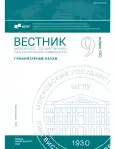REFLECTION OF CULTURAL VALUES IN COMMUNICATIVE BEHAVIOR (ON THE MATERIAL OF SPEECH ACT “EXPRESSION OF DISAGREEMENT” IN UZBEK LINGUOCULTURE)
- Авторлар: Alieva I.A.1
-
Мекемелер:
- Moscow State Linguistic University
- Шығарылым: № 9(890) (2024)
- Беттер: 23-28
- Бөлім: Linguistics
- URL: https://bakhtiniada.ru/2542-2197/article/view/297407
- ID: 297407
Дәйексөз келтіру
Аннотация
This article explores the influence of cultural values of an ethnic group on communicative behavior. It analyzes the ways of expressing disagreement by Uzbek informants on the basis of the discourse completion test. The representatives of Uzbek linguoculture often avoid direct disagreement using such tactics as mitigation, providing explanations, making counteroffers or partially agreeing while redirecting. Indirectness and conflict avoidance become noticeable tendencies reflecting Uzbek cultural values.
Авторлар туралы
Iroda Alieva
Moscow State Linguistic University
Хат алмасуға жауапты Автор.
Email: iroda.aliyeva73@gmail.com
PhD Student, Department of General and Comparative Linguistics, Moscow State Linguistic University
РесейӘдебиет тізімі
- Wierzbicka, A. (2003). Cross-Cultural Pragmatics: The Semantics of Human Interaction. De Gruyter Mouton.
- Brown, P., Levinson, S. (1987). Politeness: Some Universals in Language Usage. Cambridge University Press.
- Reeves, M. (2011). The Spectacular State: Culture and National Identity in Uzbekistan – By Laura L. Adams. The Sociological Review. https://doi.org/10.1111/j.1467-954X.2011.02009_3.x
- Merkin, R. (2015). The Relationship between Individualism / Collectivism Consultation and Harmony Needs. Journal of Intercultural Communication, 15(3), 1–17. https://doi.org/10.36923/jicc.v15i3.704
- Vorob’jov, V. V., Poljakova, G. M. (2012). Sopostavitel’naja lingvokul’turologija kak novoe nauchnoe napravlenie [Comparative linguoculturology as a new scientific direction]. Rusistika [Russian Language Studies], 2. https://cyberleninka.ru/article/n/sopostavitelnaya-lingvokulturologiya-kak-novoe-nauchnoe-napravlenie (accessed: 17.04.2024). (In Russ.)
- Pjej Sjanlin’, Germanova, N. N. (2021). Koncept «lico» v kollektivistskoj kul’ture Kitaja = The concept of “face” in the collectivist culture of China. Cognitive Studies of Language, 1(44), 299–306. (In Russ.)
- Blum-Kulka, S., House, J., Kasper, G. (1989). Cross-Cultural Pragmatics: Requests and Apologies. Ablex Pub.
- Germanova, N. N. (2021). Test na zavershenie diskursa v kontekste kognitivnoj lingvopragmatiki = Discourse completion test in the context of cognitive linguopragmatics. Cognitive Studies of Language, 4(47), 84–90. (In Russ.)
- Leontovich, O. A. (2014). Teorija Mezhkul’turnoj Kommunikacii = [Theory of intercultural communication]: textbook. URSS. (In Russ.)
- Holmes, J. (1995). Women, Men and Politeness. Longman.
- Emtyl, R. Kh. (2016). Otrazhenie nacional’nogo mentaliteta v poslovicah, pogovorkah i aforizmah H. Anchoka = The reflection of national mentality in proverbs, sayings and aphorisms of Khadzhibech Anchok. Cultural Studies of Russian South, 4, 130–138. (In Russ).
- Ziyaeva, D. H. (2002). The role of women in social and political life in the history of Uzbekistan. In Proceedings of the Scientific-Practical Conference “Women of Uzbekistan Yesterday and Today” (p. 6). https://www.e3s-confer-ences.org/articles/e3sconf/ref/2023/57/e3sconf_ebwff2023_06053/e3sconf_ebwff2023_06053.html
- Peshkova, S. H. (2009). Jazyk, identichnost’ i vlast’ v postsovetskom Uzbekistane [Language, identity and power in post-Soviet Uzbekistan] (PhD dissertation). Tashkent. (In Russ.)
- Peshkova, S. H. (2020). Musul’manskie zhenshhiny, subjektnost’ i vlast’ v Uzbekistane = Muslim women, subjectivity and power in Uzbekistan. In Sjeda, D., Pio, Je. (Eds.), Vera, Feminizm i Mezhdunarodnye Otnoshenija (pp. 167–183). Moscow: Ves’ mir. (In Russ.)
- Linn, A., Bezborodova, A., Radjabzade, S. (2020). Tolerance and Control. Developing a language policy for an EMI university in Uzbekistan. Sociolinguistica, 34, 217–237. https://doi.org/10.1515/soci-2020-0013
Қосымша файлдар










